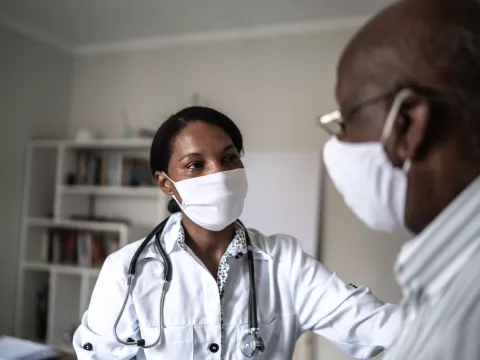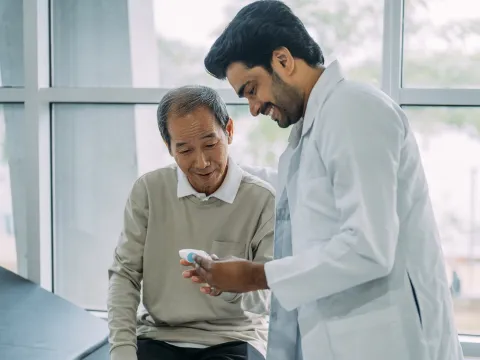- AdventHealth

Choose the health content that’s right for you, and get it delivered right in your inbox.
Did you know colon cancer is one of the few cancers that can be both detected and prevented through early diagnostic screening? Expert gastroenterologist Maria Ana Jeanellee Soriano Co, MD, explains how simple screenings are the key to preventing diseases like colorectal cancer, the second leading cause of cancer deaths among Americans.
“A colorectal screening can detect the presence of cancer or benign polyps — growths that can be removed before they potentially become cancer,” says Dr. Co. Since polyps and early-stage colon cancer are “silent” (producing no symptoms), screening procedures are the only means of finding and treating them.
Test your knowledge with four questions to make sure you know the facts about this important preventive screening.
Colonoscopy Myth or Fact?
- Only people at high risk need to be screened.
- There’s no one right way to be screened.
- You may need to start testing before age 50 if you have inflammatory bowel disease.
- Hospitals aren’t doing routine preventive screenings due to COVID-19 concerns.
Check Your Answers
1. Myth. The American Cancer Society recommends all men and women with an average risk for colorectal cancer get a colonoscopy starting at age 45.
2. Fact. Though many doctors consider colonoscopies the gold standard of screening, talk to your doctor to see what options you may have. One possible option is an annual test to check for blood in your stool. Dr. Co explains, “Most screenings involve a colonoscopy, fecal occult blood test (FOBT), flexible sigmoidoscopy or a stool DNA test.” Your doctor will discuss what screening is best for you. Others include:
- Every five years: a flexible sigmoidoscopy, in which the doctor places a lighted tube into the rectum to check the lower part of the colon
- Every five years: a virtual colonoscopy, in which X-rays and computers produce images of the entire colon
- Every 10 years: a colonoscopy, in which a doctor inserts a tube into the rectum to view the colon
3. Fact. Screening before age 50 is smart if you or a close relative has had polyps or cancer. Even if your risk is average, you may want to begin screening at age 45, as the American Cancer Society now recommends. Talk with your doctor about the screening schedule that works best for you. “Colon cancer screening should begin at 50 for most people,” says Dr. Co. “However, if you have a family history of colorectal cancer, screenings could start as early as 40.”
4. Myth. Hospitals are more than ready to resume preventive health services. While it’s true that medical teams are still taking care of people with COVID-19 symptoms, they're doing so in safe, separate areas of our facilities.
Here for Your Whole Health, Your Whole Life
It’s normal to feel nervous about getting screened, but preventive care can save your life. Rest assured that we’re taking enhanced safety precautions to protect you while you’re in our care, including requiring face masks, conducting temperature testing for every person at every entry point, enforcing a restricted visitor policy and redesigning common areas to ensure social distancing.
Our goal is to keep you from ever having to fight a cancer battle. But if you do, we’re here for you with continuous compassion and expertise. Learn more about AdventHealth’s gastrointestinal cancer care services here.



